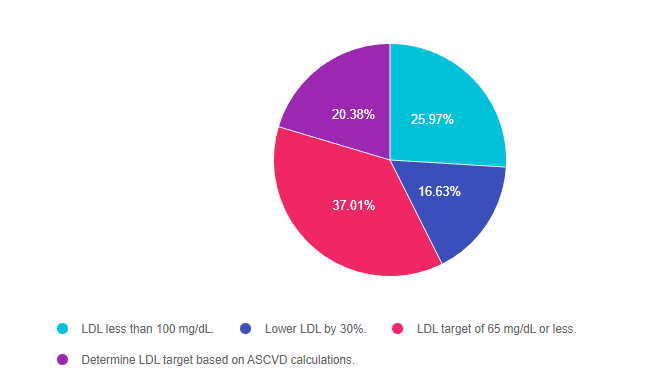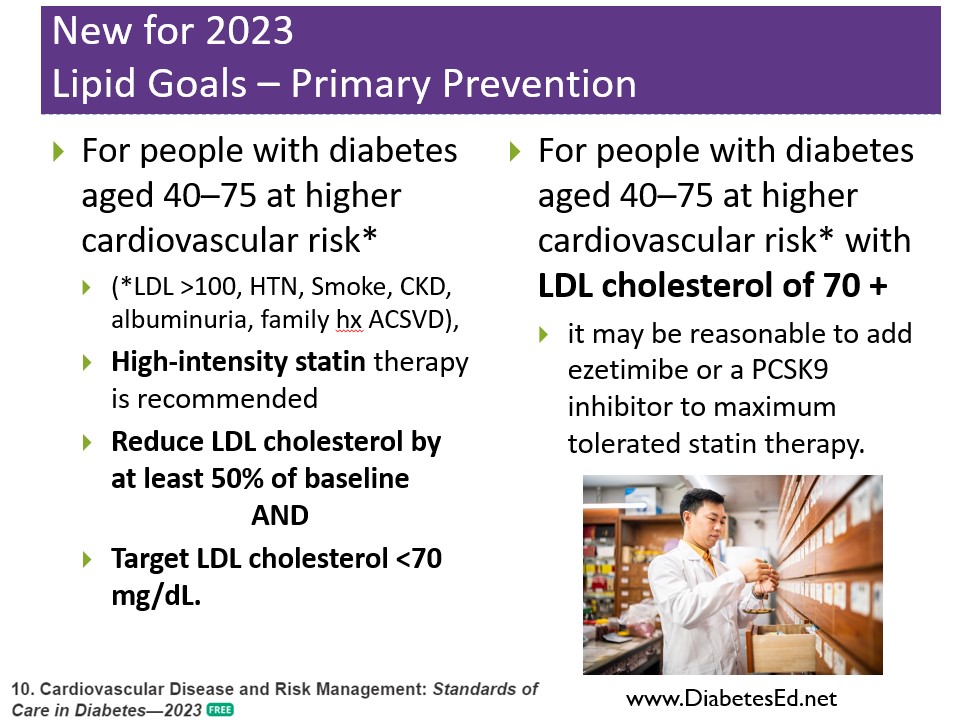
For last week’s practice question, we quizzed participants on what is the right LDL target. 37% of respondents chose the best answer. We want to clarify and share this important information, so you can pass it on to people living with diabetes and your colleagues, plus prepare for exam success!
Before we start though, if you don’t want any spoilers and haven’t tried the question yet, you can answer it below: Answer Question
Question:
RZ is 47 years old with type 2 diabetes and hypertension with a UACR of 199 mg/g. RZ takes metformin 1000 mg BID, plus lisinopril 20mg daily. RZ most recent LDL Cholesterol was 130 mg/dL. The provider writes an order for DASH meal planning education and initiation of atorvastatin 40mg.
Based on the most recent ADA Standards, what is the LDL Cholesterol target for RZ?
Answer Choices:
- LDL less than 100 mg/dL.
- Lower LDL by 30%.
- LDL target of 65 mg/dL or less.
- Determine LDL target based on ASCVD calculations.

Getting to the Best Answer
Answer 1 is incorrect. 25.97% chose this answer, “LDL less than 100 mg/dL.” This is a juicy answer since it is the OLD LDL goal from several years ago. But the new 2023 lipid guidelines have even more intense goals for high-risk individuals. Since RZ has diabetes, hypertension, and albuminuria (UACR >30mg/g), they have an elevated risk of ASCVD. Given their risk status, the 2023 guidelines recommend reducing LDL by at least 50% of baseline and target LDL cholesterol to less than 70 mg/dL (see slide below).
Answer 2 is incorrect. 16.63% of you chose this answer, “Lower LDL by 30%.” Another juicy answer. Given RZ’s risk status, the 2023 guidelines recommend reducing LDL by at least 50% of baseline and target LDL cholesterol to less than 70 mg/dL. (see slide below).
Answer 3 is correct. 37.01% of respondents chose this answer, “LDL target of 65 mg/dL or less.” GREAT JOB! Since RZ has diabetes, hypertension, and albuminuria (UACR >30mg/g), they have an elevated risk of ASCVD. Given their risk status, the 2023 guidelines recommend reducing LDL by at least 50% of baseline and target LDL cholesterol to less than 70 mg/dL. Since RZ’s current LDL is 130, the goal is to reduce the LDL by at least 50% (LDL of 65mg/dL) AND less than 70 mg/dL by using a high-intensity statin and lifestyle therapy, (see slide below).
Finally, Answer 4 is incorrect. 20.38% chose this answer, “Determine LDL target based on ASCVD calculations.” Although this information would be helpful, it wouldn’t change the lipid goals. Given their risk status, the 2023 guidelines recommend reducing LDL by at least 50% of baseline and target LDL cholesterol to less than 70 mg/dL, (see slide below).
Thank you so much for reading this “Rationale of the Week”.

We also invite you to join our Online Courses for more information (see info below)
Hope you can join our ADA Standards of Care Webinar Update in February and our other Level 2 Courses.
Want to learn more about this question? Join us for our
Level 2 | ADA Standards of Care CE Course | 2.0 CEs
Updates air live between Feb. 2, 2023, at 11:30 am PST

This course, updated annually, is an essential review for anyone in the field of diabetes. Join Coach Beverly as she summarizes the 2023 updates to the American Diabetes Association’s Standards of Medical Care in Diabetes and provides critical teaching points and content for healthcare professionals involved in diabetes care and education.
Objectives:
- List significant changes and updates to the 2023 ADA Standards of Medical Care.
- State 3 updates on new blood pressure and lipid goals.
- Identify 5 key elements of the position statement.
- Discuss how to apply the Standards in the clinical setting and in preparation for exam success.
Intended Audience: This course is a knowledge-based activity designed for individuals or groups of diabetes professionals, including RNs, RDs, Pharmacists, Nurse Practitioners, Clinical Nurse Specialists, Physician Assistants, and other health care providers interested in staying up to date on current practices of care for people with prediabetes, diabetes and other related conditions.
Don’t worry if you can’t make it live. Your registration guarantees access to the recorded version in the Online University.
All hours earned count toward your CDCES Accreditation Information
Preparing for Diabetes Certification Exam? Enroll in our Level 3 – Boot Camp 2023 Updates
Level 3 | DiabetesEd Specialist Boot Camp | 12+ CEs

Can’t join all the sessions live? No problem. Your registration guarantees you access to the recorded lectures for a full year.
This bundle is specifically designed for healthcare professionals who are studying for the Board Certified in Advanced Diabetes Management (BC-ADM) or the Certified Diabetes Care and Education Specialist (CDCES) certification exam.
Intended Audience: This library of critical information is designed for individuals or groups of diabetes specialists, including RNs, RDs, Pharmacists, Nurse Practitioners, Clinical Nurse Specialists, Physician Assistants, and other health care providers interested in staying up to date on current practices of care for people with diabetes and preparing for the BC-ADM or the CDCES certification Exam.
2023 Webinar Updates
- February 7, 2023 – Class 1 – Diabetes – Not Just Hyperglycemia 1.75 CEs
- February 9, 2023 – Class 2 – Standards of Care & Cardiovascular Goals 1.8 CEs
- February 14, 2023 – Class 3 – Meds for Type 2 – What you need to know 1.5
- February 16, 2023 – Class 4 – Insulin Therapy – From Basal/Bolus to Pattern Management 1.5 CEs
- February 21, 2023 – Class 5 – Insulin Intensive – Monitoring, Sick Days, Lower
- February 23, 2023 – Class 6 – Exercise and Medical Nutrition Therapy 1.5 CEs
- February 28, 2023 – Class 7 – Screening, Prevention, and Treatment of Microvascular Complications
- March 2, 2023 – Class 8 – Coping and Behavior Change 1.5 CEs
- March 9, 2023 – Class 9 – Test-Taking Coach Session (48 Questions) No CE
All hours earned count toward your CDCES Accreditation Information
Sign up for Diabetes Blog Bytes – we post one daily Blog Byte from Monday to Friday. And of course, Tuesday is our Question of the Week. It’s Informative and FREE! Sign up below!
The use of DES products does not guarantee the successful passage of the CDCES exam. CBDCE does not endorse any preparatory or review materials for the CDCES exam, except for those published by CBDCE.









